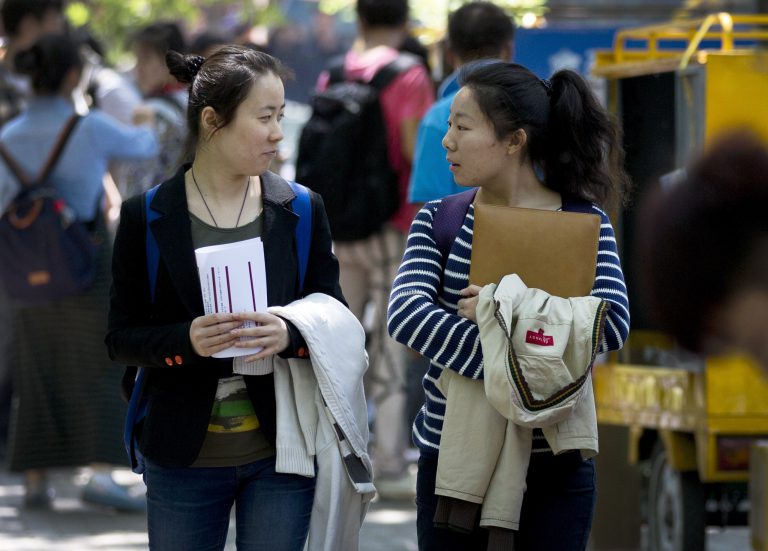
Reposted from Asian Correspondent
Australian universities have come under increased pressure this week to review international student recruitment practices after a damning ABC documentary exposed what it described as “systemic abuse of the system”.
‘Degrees of Deception’, which aired in Australia Monday night, came on the back of a report released by the Independent Commission Against Corruption (ICAC) last week which urged New South Wales (NSW) universities to take the necessary steps to ensure they do not sacrifice academic standards in the cut-throat business of recruiting international students.
“In the search for international students, some universities in NSW are entering markets where document fraud and cheating on English-language proficiency tests are known to exist. Some universities are using up to 300 local intermediaries or agents to market to and recruit students, resulting in due diligence and control challenges,” said the ICAC.
At the heart of the issue are the massive revenues to be gained by Australian universities from recruiting international students. The number of fee-paying international students in NSW is 13 times higher today than it was in 1988, while international education is Australia’s 4th largest export, netting the economy AUS$16.6 billion (US$12.8 billion) in 2014.
Fees paid by international students are a key source of revenue for most Australian universities, with 17 percent of total revenues coming from overseas students.
According to Study in Australia, the official government website for international students, yearly fees for undergraduate bachelor’s degrees for international students range from AUS$15,000 (US$11,540) to AUS$33,000 (US$25,395); a postgraduate master’s degree ranges from AUS$20,000 to AUS$37,000; and a doctoral degree from AU$S14,000 to AUS$37,000.
Competition among Australian universities and an increasingly competitive global education market has led to many higher education institutes lowering their verification and academic standards to attract more students from overseas. The ICAC said that universities are using corrupt agents in countries “where document fraud and cheating on English-language proficiency tests are known to exist”. It added that many universities are aware of, and even participate in, malpractice.
“Students may be struggling to pass, but universities cannot afford to fail them,” the report said.
It added: “The gap between student capabilities and academic demands increases the likelihood that students will offer inducements to academics in order to pass courses and, conversely, makes students more vulnerable to improper demands from academics. With universities in NSW financially dependent on the success of international students, academics may be encouraged to admit students they would otherwise reject, to turn a blind eye to cheating and to mark the work of poor-performing students favourably to enable them to pass.”
‘Degrees of Deception’
ABC’s documentary, ‘Degrees of Deception’, spoke to academics who said universities in Australia were turning a blind eye to plagiarism.
“We’ve got to pass the vast majority of our students no matter what their level is, no matter what their prior knowledge is, no matter how much or how little effort they put in,” Paul Fritters, a University of Queensland professor, told the program.
Rena O’ Connor, of the University of Sydney’s architecture, design and planning faculty, said some international students’ level of English was so low that “their emails and essays were almost impossible to decipher”.
Reporters also went undercover in China – Australian universities’ biggest overseas market – where it found one agent willing to accept falsified English-language test documents from prospective students, a situation that leads to “poor English speakers… graduating as nurses from Australian universities dangerously under qualified”.
Barbara Beale, former lecturer at the University of Western Sydney’s School of Nursing, said there was constant pressure at the university to pass failing nursing students and that standards are dropping “year after year”.
“They [graduates] might find themselves being the only registered nurse on duty. And that is something that frightens me,” she said.
In a response to the documentary, dated April 16, the University of Western Sydney rejected ABC’s claims: “UWS completely rejects the accusation that the standard of our nursing program is ‘falling’ and our nursing students are ‘weak and unsafe’. The University also strongly refutes any claim of ‘soft marking’. The University has rigorous standards and criteria for marking assignments to ensure consistency across all markers.”
It added: “The University rejects any assertion that its entry requirements are set, or relaxed, for the University’s financial gain.”
While admitting that there are “no simple solutions” for universities looking to maintain revenues from international students while maintaining rigorous academic standards, the ICAC outlined 12 initiatives universities could undertake to tackle the problem. These include limiting relationships with overseas agents and separating compliance from business development.
Some Australian universities are already exploring the rapidly changing student recruitment landscape to find ways of cutting out foreign agents while attracting fully vetted international students who will not struggle with the academic demands of studying in Australia.
With clients including Bond University and University of Newcastle, Study International eliminates the need for overseas agents by connecting universities with international students who meet the academic, visa and financial requirements to enroll in Australia’s top universities.
“We believe in digital marketing as opposed to using estranged third party agents to find students. A lot of universities come to us because they are tired of working with local agents who don’t always live up to their quality and compliance standards,” said managing director James Craven.
“Going forward it’s critical that all universities do more to run their international marketing independently as oppose to using third party agents. That’s the path to long term, sustainable international recruitment for Australian institutions.”







